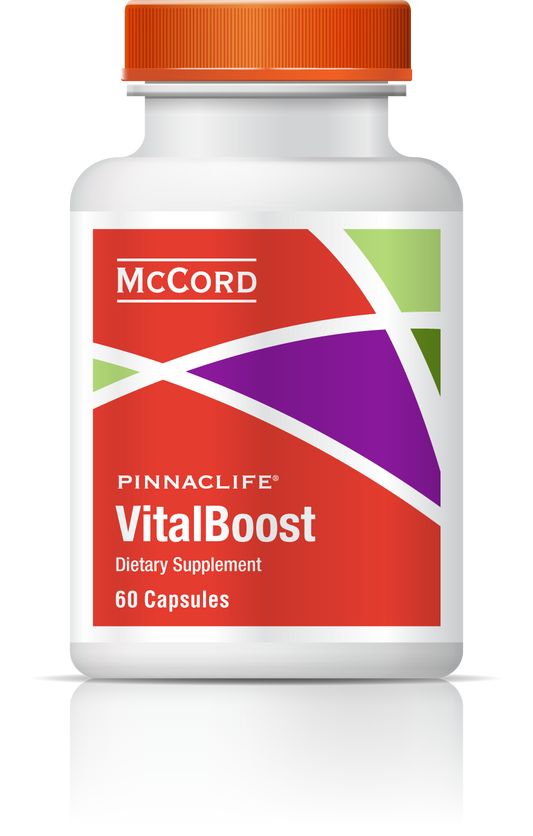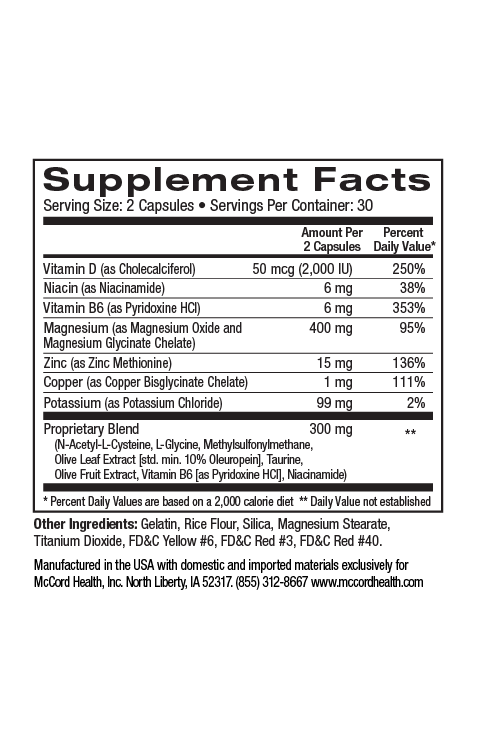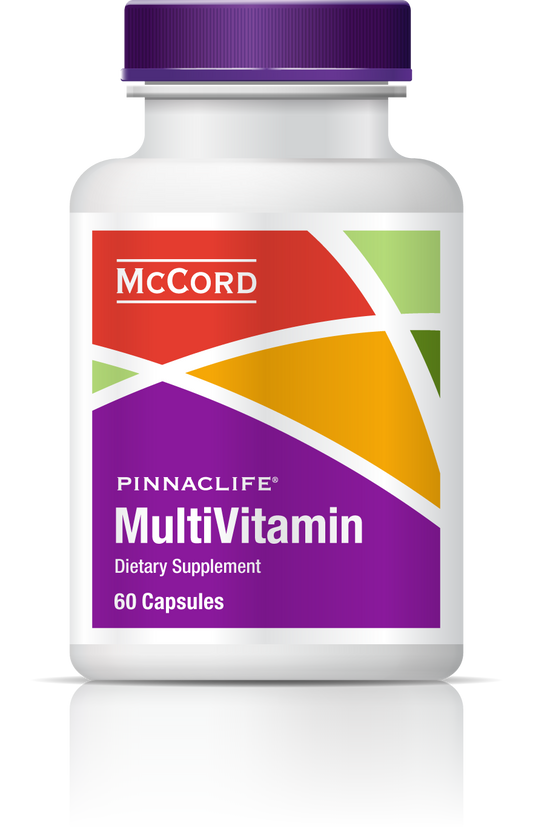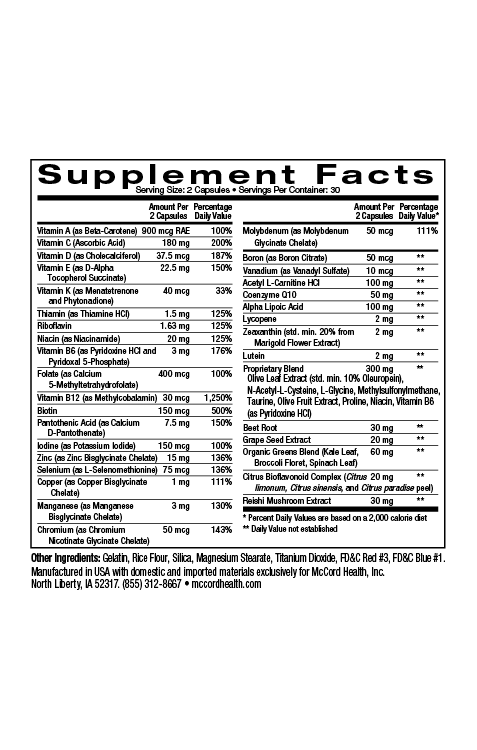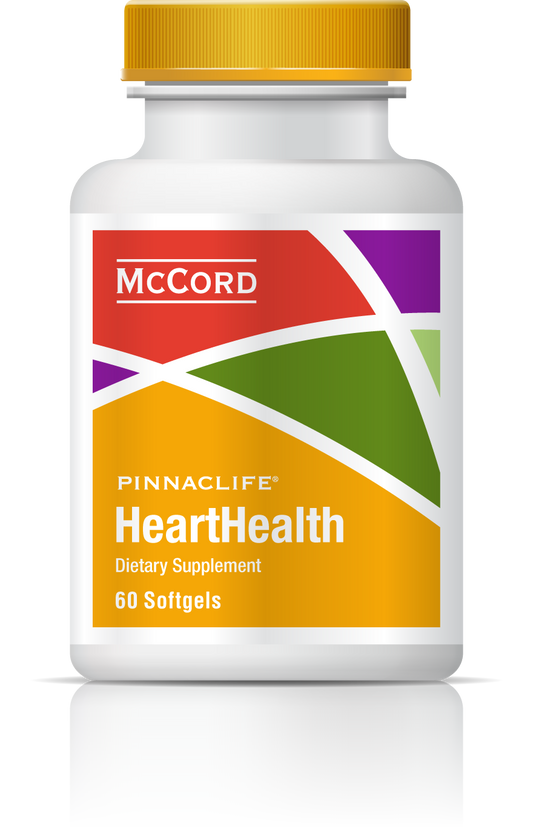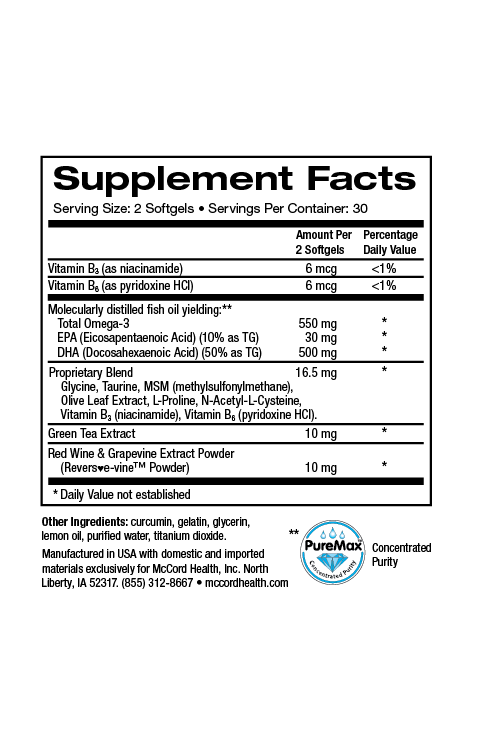Vitamins are water-soluble or fat-soluble compounds that can be obtained by dietary intake or supplementation. Some are also synthesized in the human body including by intestinal bacteria, but they are typically synthesized in the body in insufficient quantities. Vitamins can act as cofactors for important enzymes and they are essential for normal growth, metabolism, and reproduction1,2. Many vitamins can be found in various foods, although it is difficult to eat the variety of meats, fruits, nuts, seeds, and vegetables required to get enough of the vitamins you need in your diet. Pinnaclife® MultiVitamin with Proprietary Blend can help provide the vitamins you need for your health.
- Low levels or deficiencies in vitamins are risk factors for many diseases
- Vitamins are often cofactors for enzymes required for biosynthesis reactions in the body
- Various vitamins found in Pinnaclife® MultiVitamin with Proprietary Blend are important for vital functions and tissues in the body including eye, blood, nerve, and skin
- Pinnaclife® MultiVitamin with Proprietary Blend contains vitamins that are important for total body health
- Proprietary Blend that includes the potent olive polyphenols hydroxytyrosol and oleuropein along with other important nutrients is also found in Pinnaclife® MultiVitamin to help support overall health
Vitamin A (beta carotene)
Vitamin A is a fat-soluble compound found as preformed (already formed) retinol or as a provitamin, beta carotene (converted in the body to vitamin A). Vitamin A has important functions for eyesight, immunity, and red blood cell production. In addition, it helps regulate gene expression and is important for healthy skin. Recently, scientists have discovered that vitamin A helps prevent the intestinal immune system from becoming overactive, a serious problem that can lead to inflammatory bowel disease. The earliest symptom of deficiency (in both retinol and beta carotene) is night blindness. Vitamin A deficiency is also associated with an increased susceptibility to infections, as well as thyroid and skin disorders3.
Vitamin B1 (Thiamin)
Thiamin functions as a co-enzyme in the metabolism of carbohydrates and branched-chain amino acids and is a major factor in the metabolism of glucose. In fact, ingestion of simple carbohydrates like glucose automatically increases the need for dietary thiamin. High caloric malnutrition is typically associated with thiamin deficiency. Thiamin is required in order to have a normal appetite. It plays a critical role in maintaining correct nervous system functioning and is required for neuronal communication3.
Vitamin B2 (Riboflavin)
Riboflavin functions as a co-enzyme in several oxidation and reduction reactions in the body. Riboflavin is essential for the production of energy from food and the conversion of the amino acid tryptophan into vitamin B3. It is also directly linked to the metabolism of other important vitamins including vitamin B12, B9, B6, vitamin K, and vitamin D. Riboflavin helps maintain the integrity of mucous membranes, skin, eyes, and the nervous system. Riboflavin deficiencies compromise oxidative defense mechanisms by interfering with the maintenance of reduced glutathione, the master antioxidant within cells4,5.
Vitamin B3 (Niacinamide)
Niacinamide plays an important role in energy production, enzyme functioning, digestion, and the promotion of a normal appetite, healthy skin, and nerves. Vitamin B3 deficiency can result in pellagra, which is characterized by dermatitis, diarrhea, and dementia (the three D’s of pellagra). Niacinamide is a good form of vitamin B3 because unlike niacin (the most common form), it does not cause flushing, burning, or tingling sensations caused by vasodilation1.
Vitamin B5 (Pantothenic Acid)
Pantothenic acid is involved in the production of energy and hormones. It is a component of coenzyme A, which is required for numerous chemical reactions including those involving fatty acid, carbohydrate, and amino acid metabolism. Vitamin B5 deficiency results in a general feeling of discomfort or illness1,6.
Vitamin B6 (Pyridoxine HCl and Pyridoxal-5-Phosphate)
Vitamin B6 is required for the body to make neurotransmitters, serotonin, noradrenalin, and myelin. It helps the body absorb vitamin B12 and controls blood levels of the amino acid homocysteine that may be critical for lowering susceptibility to heart disease and stroke1,7,8.
Vitamin B7 (Biotin)
Biotin is essential for the release of energy from carbohydrates and for the metabolism of fat, amino acids, and carbohydrates. Biotin also plays a role in gene regulation. Biotin is important for healthy skin, hair, and nails and some evidence suggests that it can help with hair thinning. Biotin deficiency is rare but can be caused by eating raw eggs, due to the fact that avidin, a compound contained in raw egg white, binds quite effectively to biotin and prevents its absorption from the gastrointestinal tract1.
Vitamin B9 (Folate)
Folate helps with protein metabolism, the promotion of red blood cell formation and maturation, and the synthesis of the DNA bases (nucleic acids) that make up DNA. Folate is required for the metabolism of homocysteine, and therefore may reduce the risk for cardiovascular disease. Deficiency is actually not uncommon. A potential cause of deficiency is during chemotherapy treatments such as with methotrexate9.
Vitamin B12 (Cobalamin)
Vitamin B12 is important for nerve tissue (myelin) synthesis and repair, brain function, and the production of red blood cells. It is also important for nucleic acid metabolism. Deficiency most typically affects strict vegetarians and it can result in irreversible neurological symptoms1.
Vitamin C (ascorbic acid)
Vitamin C is essential for the biosynthesis of collagen and it is a co-factor in the synthesis of L-carnitine, cholesterol, amino acids, and some hormones as well as some neurotransmitters and gene regulatory enzymes. Vitamin C contributes to immune defense by supporting various cellular functions of the immune system. It helps metabolize proteins and its important antioxidant and anti-inflammatory activities can decrease the risk of various diseases. It also helps promote wound healing due in large part to its role in the synthesis of collagen10.
Vitamin D (cholecalciferol)
Vitamin D is a fat-soluble micronutrient that is synthesized in the human body when skin is exposed to ultraviolet (UV) light. Vitamin D is also found in fish or fish oil. However, vitamin D deficiency is common. In fact, 42% of Americans are deficient in vitamin D11 and deficiency is a major health concern due to the fact that it was found to be a risk factor for decreased longevity. In an important study this risk was found to be 164% higher among patients with lower levels of vitamin D, but the risk was reduced in patients with low vitamin D levels after taking a supplement containing vitamin D12. Pinnaclife® MultiVitamin® with Proprietary Blend contains vitamin D to help lower the risk of reduced health and longevity.
Low levels of vitamin D are also associated with obesity, which is a state of low-grade inflammation. In fact, in a study that included people over 65, an increased risk of vitamin D deficiency was indicated in overweight individuals. It’s not clear what contributes to lower levels of vitamin D in obese individuals but reduced intestinal absorption, altered metabolism, and reduced synthesis in skin have been considered as possibilities. The good news is that the latest research on vitamin D deficiency supports a role for vitamin D in the prevention of obesity13.
Vitamin E (D-alpha, tocopherols, tocotrienols)
Vitamin E is a family of fat-soluble compounds. It occurs naturally in eight forms including alpha, beta, gamma, delta, and four tocotrienols. Alpha tocopherol is the most common and most potent form. Vitamin E is a powerful antioxidant that protects cells from damage and may lower the risk of various health problems. It plays an important role in protecting eyesight and in the production of hormone-like substances called prostaglandins that regulate blood pressure and muscle contraction14.
Vitamin K1/K2 (phytonadione/menaquinone)
Vitamin K is a fat-soluble vitamin known as the coagulation vitamin. Vitamin K is necessary for the body’s production of prothrombin, a protein important for blood clotting and bone metabolism. Vitamin K1 (phylloquinone family including phytonadione) comes from plants and is the main type of dietary vitamin K. When consumed, bacteria in the large intestine convert vitamin K1 to Vitamin K2 (menaquinone) that also occurs in some animal-based and fermented foods. Vitamin K deficiency is rare but can lead to decreased clotting15.
Overall Health and Proprietary Blend
Insufficient intake or small deficiencies in various vitamins are risk factors for many diseases including eye disease. In addition, other adverse deficiency effects may occur including anemia and poor blood cell function. Pinnaclife® MultiVitamin provides many nutrients that help increase overall health. In fact, Pinnaclife® MultiVitamin contains Proprietary Blend http://www.olivamine.com that includes the potent olive polyphenols hydroxytyrosol and oleuropein as well as other important antioxidants and nutrients that help support overall health.
References
- S Afr Pharm J 2015; 82(4): 28-32.
- Microb Cell Fact 2017; 16: 79, 1-10.
- J Med Plants Res 2011; 5(20): 4977-4979.
- Adv Nutr 2016; 7: 973-975.
- Crit Rev Food Sci Nutr 2017; 57(17): 3650-3660.
- Vitam Horm 1991; 46: 165-228.
- Nutrients 2016; 8: 725: doi: 10.3390/nu8110725.
- Stroke Vasc Neurol 2018; 3: e000156: 51-58.
- Int J Vitam Nutr Res 2012; 82(5): 348-354.
- Front Biosci 2013; 18: 1017-1029.
- Nutr Res 2011; 31: 48-54.
- Cardio 2012; 109(3): 359-363.
- Rev Endocr Metab Disord 2017; 18(2): 215-225.
- Crit Rev Clin Lab Sci 2008; 45(5): 417-450.
- J Nutr Metab 2017; ID6254836, 1-6.

